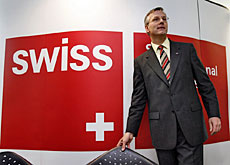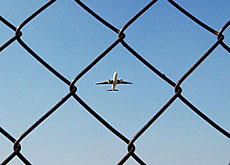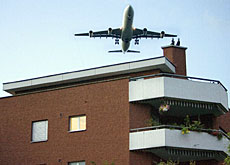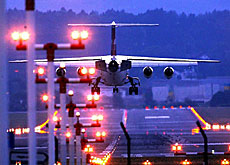Franz speaks out against flight restrictions

Swiss International Air Lines chief executive Christoph Franz has made the case for easing restrictions on Zurich's air transport hub, in an interview with swissinfo.
Voters in canton Zurich will cast their ballots this autumn on a people’s initiative proposing a limit on the number of flights at Switzerland’s largest airport.
Zurich Kloten is Switzerland’s only hub airport that plays a major role not only for passenger traffic but also for freight shipments. Its future role is closely linked with the fortunes of Swiss.
In addition to the people’s initiative aimed at reducing noise disturbance to the surrounding areas, flights to and from the airport have also been restricted by a German night-time ban on movements over its southern airspace.
swissinfo: Why is the fate of Swiss connected to the future development of Zurich airport?
Christoph Franz: For a national airline it is crucial what happens to its home airport. Our ability to compete revolves around Switzerland’s status as a location for air traffic. Without transfer traffic we could not fill our planes, because the short-haul traffic is not sufficient.
Zurich airport is competing with other European hubs that could also handle Swiss passengers and freight. From the perspective of passengers, Zurich offers many advantages. As a result, many travellers want to transfer in Zurich and that is the function of a hub.
If Switzerland is not able to create the correct basic conditions it risks passengers drifting off to other foreign hubs. The operational limitations imposed by German regulations and regional restriction initiatives limit not only Swiss but damage Switzerland’s standing as an air traffic location altogether.
swissinfo: Why are you resisting an extension of the night flight ban and other flight restrictions?
C.F.: There are no other hubs in Europe or the rest of the world that have a seven-hour night-flight ban. If the barrier was to be expanded to eight or nine hours, the hub could simply not operate at a reasonable level any more. Too many connection slots would be omitted.
It concerns the efficiency of the airport also in the area of freight traffic that services the export industry. Every third franc of exports is transported by air, even if the total volume of exports handled is only four per cent. Such a traffic infrastructure is therefore of national importance and should be developed.
Decisions about the number of flight movements should therefore not just be down to people who build their homes near flight paths. The whole Swiss economy benefits substantially from good air traffic connections.
swissinfo: Is there any current building under flight paths?
C.F.: At the moment there are new homes for 6,000 people to the south of the airport, in Opfikon. Once they are occupied, it would probably take no more than three months before the letter boxes are full of mail calling for flight restrictions.
swissinfo: Why can’t centres of urban population be bypassed when airports are built?
C.F.: Because the development runs in reverse. The airports are not built into settlement areas, but everywhere in the world settlements develop automatically around the airports. In Munich for example the airport was originally built far outside the city, but now it lies in the middle of a population centre. This is because airports create growth and prosperity.
swissinfo: The noise level can nevertheless not be dismissed.
C.F.: Noise levels do not have fixed lines. A noise map was drawn up around the airport to measure disturbance levels, indicating areas affected by 60 decibels. This surface shrank between 1975 and today by more than half approximately.
The contraction of the noise map came about in spite of an expansion in flight movements. In 1975 they numbered 110,000 compared with 260,000 in 2006.
swissinfo: So flight restrictions have no effect on noise?
C.F.: If the flight restriction initiative had been introduced in 1975, we would have fewer flight movements today, but the incentive to develop and purchase quieter types of aircraft would also be greatly reduced.
Historically there has existed a kind of pact between the population and aviation. The airline Swiss can contribute to economic growth by means of increased flight movements. It also gives the Swiss the chance to purchase ever quieter and more fuel-efficient aircraft.
swissinfo-interview: Alexander Künzle
In the first half of 2007 Swiss carried over 13% more passengers than in the corresponding period the previous year. Seat load factor also improved to nearly 79%.
The airline generated earnings before tax and interest (Ebit) of SFr285 million ($235 million), up from SFr98 million for the same period last year.
Consolidated net profit amounted to SFr295 million (SFr76 million in the first half of 2006) and operating income rose to SFr2.304 billion (SFr1.976 billion).
At the beginning of July this year Swiss was taken over completely by German airline Lufthansa.
Last year Swiss generated full year profits for the first time since it was established in 2002.
At present Swiss has 6,500 employees, a figure that will be increased by 10% in 2007.
The airline flies to 70 destinations in 42 countries – 43 European and 27 intercontinental destinations.
Zurich Kloten airport is the third-biggest hub for the Lufthansa group.
Canton Zurich will vote this autumn on a people’s initiative demanding a 250,000 per year flight movement cap and a nine-hour ban of flights at night.
This initiative was rejected by the cantonal authorities but will be put to a public vote after 21,000 signatures were gathered in July 2004.
The cantonal government has produced a counter-proposal, known as the Zurich Noise Index.
The index would stop flights once a noise threshold is reached, affecting roughly 47,000 people. This would equate to around 320,000 flight movements.
In 2003 Germany imposed a limit on flights to and from Zurich airport passing through its southern territory during night hours and weekends.
The air freight trade constitutes a high proportion of Swiss International Air Lines’ activities compared to its competition.
The freight load factor at Swiss amounts to 85% as opposed to 60% with most other airlines
In Europe, Swiss World Cargo is ranked as number 7 and is number one in the world for transporting high value items.

In compliance with the JTI standards
More: SWI swissinfo.ch certified by the Journalism Trust Initiative



You can find an overview of ongoing debates with our journalists here . Please join us!
If you want to start a conversation about a topic raised in this article or want to report factual errors, email us at english@swissinfo.ch.